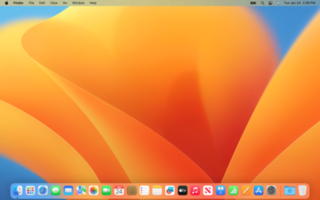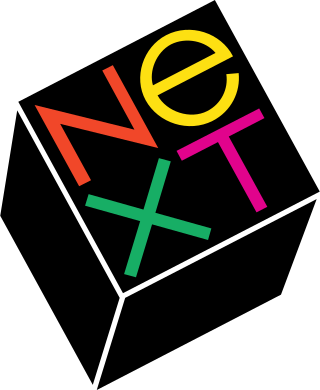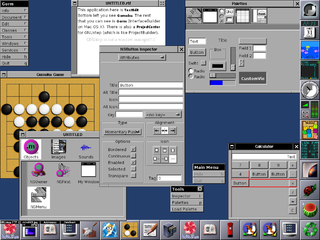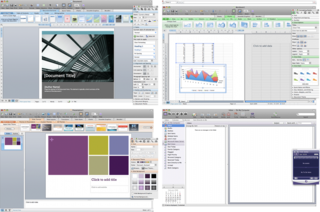
macOS is an operating system developed and marketed by Apple Inc. since 2001. It is the primary operating system for Apple's Mac computers. Within the market of desktop and laptop computers, it is the second most widely used desktop OS, after Microsoft Windows and ahead of Linux.
Darwin is the core Unix operating system of macOS, iOS, watchOS, tvOS, iPadOS, visionOS, and bridgeOS. It previously existed as an independent open-source operating system, first released by Apple Inc. in 2000. It is composed of code derived from NeXTSTEP, BSD, Mach, and other free software projects' code, as well as code developed by Apple.

OpenStep is a defunct object-oriented application programming interface (API) specification for a legacy object-oriented operating system, with the basic goal of offering a NeXTSTEP-like environment on non-NeXTSTEP operating systems. OpenStep was principally developed by NeXT with Sun Microsystems, to allow advanced application development on Sun's operating systems, specifically Solaris. NeXT produced a version of OpenStep for its own Mach-based Unix, stylized as OPENSTEP, as well as a version for Windows NT. The software libraries that shipped with OPENSTEP are a superset of the original OpenStep specification, including many features from the original NeXTSTEP.

GNUstep is a free software implementation of the Cocoa Objective-C frameworks, widget toolkit, and application development tools for Unix-like operating systems and Microsoft Windows. It is part of the GNU Project.
Carbon was one of two primary C-based application programming interfaces (APIs) developed by Apple for the macOS operating system. Carbon provided a good degree of backward compatibility for programs that ran on Mac OS 8 and 9. Developers could use the Carbon APIs to port (“carbonize”) their “classic” Mac applications and software to the Mac OS X platform with little effort, compared to porting the app to the entirely different Cocoa system, which originated in OPENSTEP. With the release of macOS 10.15 Catalina, the Carbon API was officially discontinued and removed, leaving Cocoa as the sole primary API for developing macOS applications.
The history of macOS, Apple's current Mac operating system formerly named Mac OS X until 2011 and then OS X until 2016, began with the company's project to replace its "classic" Mac OS. That system, up to and including its final release Mac OS 9, was a direct descendant of the operating system Apple had used in its Mac computers since their introduction in 1984. However, the current macOS is a UNIX operating system built on technology that had been developed at NeXT from the 1980s until Apple purchased the company in early 1997.
The Apple Filing Protocol (AFP), formerly AppleTalk Filing Protocol, is a proprietary network protocol, and part of the Apple File Service (AFS), that offers file services for macOS, classic Mac OS, and Apple II computers. In OS X 10.8 Mountain Lion and earlier, AFP was the primary protocol for file services. Starting with OS X 10.9 Mavericks, Server Message Block (SMB) was made the primary file sharing protocol, with the ability to run an AFP server removed later in macOS 11 Big Sur. AFP supports Unicode file names, POSIX and access-control list permissions, resource forks, named extended attributes, and advanced file locking.

The Mac OS X Public Beta was the first publicly available version of Apple Computer's Mac OS X operating system to feature the Aqua user interface. It was released to the public on September 13, 2000 for US$29.95. Its release was significant as the first publicly available evidence of Apple's ability to ship the "next-generation Mac operating system" after the Copland failure. It allowed software developers and early adopters to test a preview of the upcoming operating system and develop software for it before its final release. It is the only public version of Mac OS X to have a code name not based on a big cat until the release of 10.9 Mavericks in 2013. The US version had a build number of 1H39 and the international version had build number 2E14.

NuCalc, also known as Graphing Calculator, is a computer software tool made by the company Pacific Tech. The tool can perform many graphing calculator functions. It can graph inequalities and vector fields, as well as functions in two, three, or four dimensions. It supports several different coordinate systems, and can solve equations. It is available for OS X and Microsoft Windows.
MacApp is the object oriented application framework for Apple Computer's discontinued classic Mac OS. Released in 1985, it transitioned from Object Pascal to C++ in 1991's version 3.0 release, which offered support for much of System 7's new functionality. MacApp was used for a variety of major applications, including Adobe Photoshop and SoftPress Freeway. Microsoft's MFC and Borland's OWL were both based directly on MacApp concepts.

Rhapsody is an operating system that was developed by Apple Computer after its purchase of NeXT in the late 1990s. It is the fifth major release of the Mach-based operating system that was developed at NeXT in the late 1980s, previously called OPENSTEP and NEXTSTEP. Rhapsody was targeted to developers for a transition period between the Classic Mac OS and Mac OS X. Rhapsody represented a new and exploratory strategy for Apple, more than an operating system, and runs on x86-based PCs and on Power Macintosh.

The architecture of macOS describes the layers of the operating system that is the culmination of Apple Inc.'s decade-long research and development process to replace the classic Mac OS.

Microsoft Office 2008 for Mac is a version of the Microsoft Office productivity suite for Mac OS X. It supersedes Office 2004 for Mac and is the Mac OS X equivalent of Office 2007. Office 2008 was developed by Microsoft's Macintosh Business Unit and released on January 15, 2008. Office 2008 was followed by Microsoft Office for Mac 2011 released on October 26, 2010, requiring a Mac with an Intel processor and Mac OS version 10.5 or better. Office 2008 is also the last version to feature Entourage, which was replaced by Outlook in Office 2011. Microsoft stopped supporting Office 2008 on April 9, 2013.

Mac OS X Snow Leopard is the seventh major release of macOS, Apple's desktop and server operating system for Macintosh computers.

FutureBasic is a free BASIC compiler for Apple Inc.'s Macintosh.

ZTerm is a shareware terminal emulator for Macintosh operating system. It was introduced in 1992 for System 7 and has been updated to run on macOS. Its name comes from its use of the ZModem file transfer protocol, which ZTerm implemented in a particularly high-performance package. In contrast to the built-in macOS Terminal app, which only communicates with other programs, ZTerm only communicates with hardware serial ports.

The first version of Microsoft Word was developed by Charles Simonyi and Richard Brodie, former Xerox programmers hired by Bill Gates and Paul Allen in 1981. Both programmers worked on Xerox Bravo, the first WYSIWYG word processor. The first Word version, Word 1.0, was released in October 1983 for Xenix and MS-DOS; it was followed by four very similar versions that were not very successful. The first Windows version was released in 1989, with a slightly improved interface. When Windows 3.0 was released in 1990, Word became a huge commercial success. Word for Windows 1.0 was followed by Word 2.0 in 1991 and Word 6.0 in 1993. Then it was renamed to Word 95 and Word 97, Word 2000 and Word for Office XP. With the release of Word 2003, the numbering was again year-based. Since then, Windows versions include Word 2007, Word 2010, Word 2013, Word 2016, and most recently, Word for Office 365.

Mac OS is the series of operating systems developed for the Macintosh family of personal computers by Apple Computer from 1984 to 2001, starting with System 1 and ending with Mac OS 9. The Macintosh operating system is credited with having popularized the graphical user interface concept. It was included with every Macintosh that was sold during the era in which it was developed, and many updates to the system software were done in conjunction with the introduction of new Macintosh systems.











